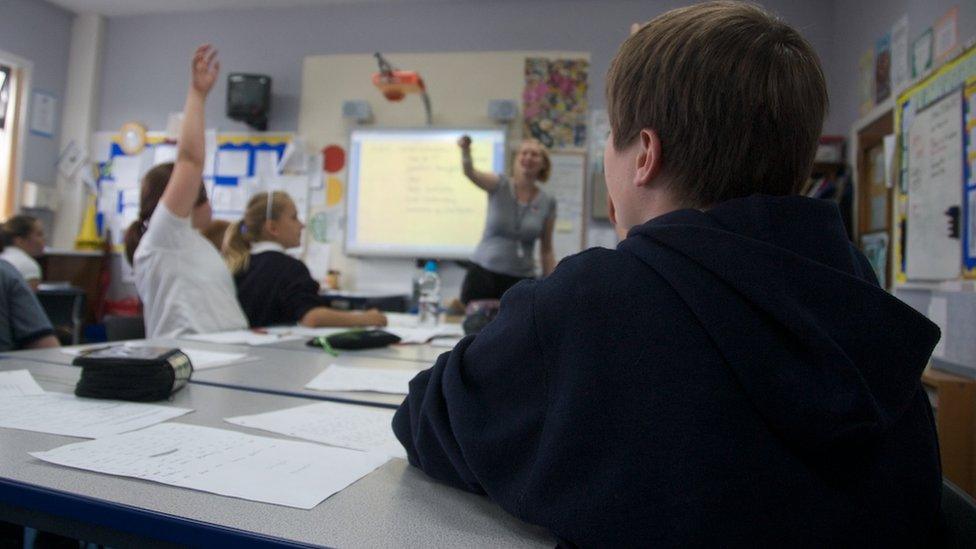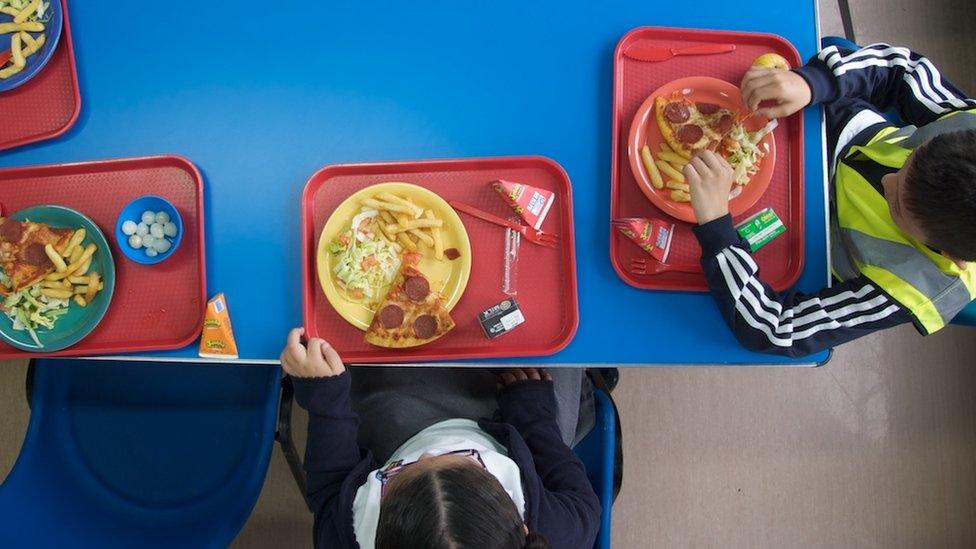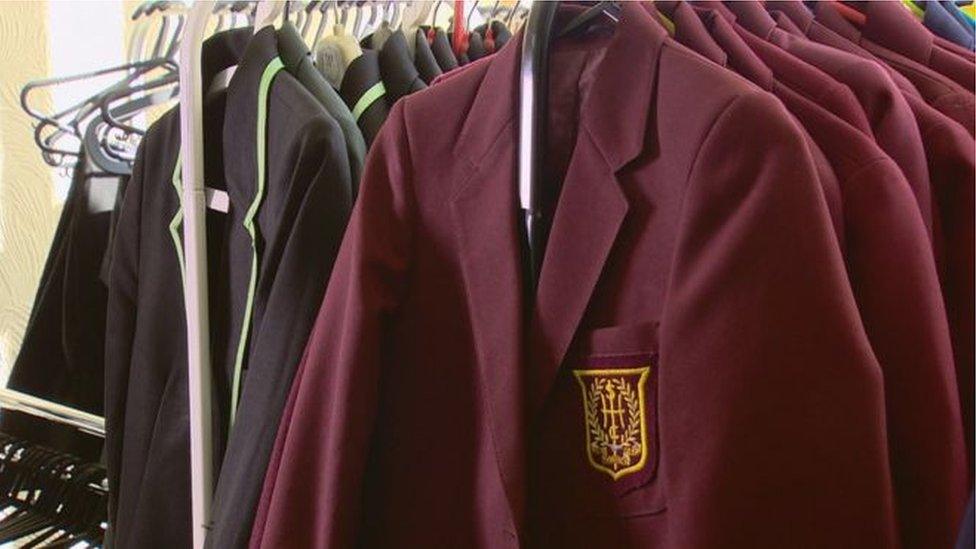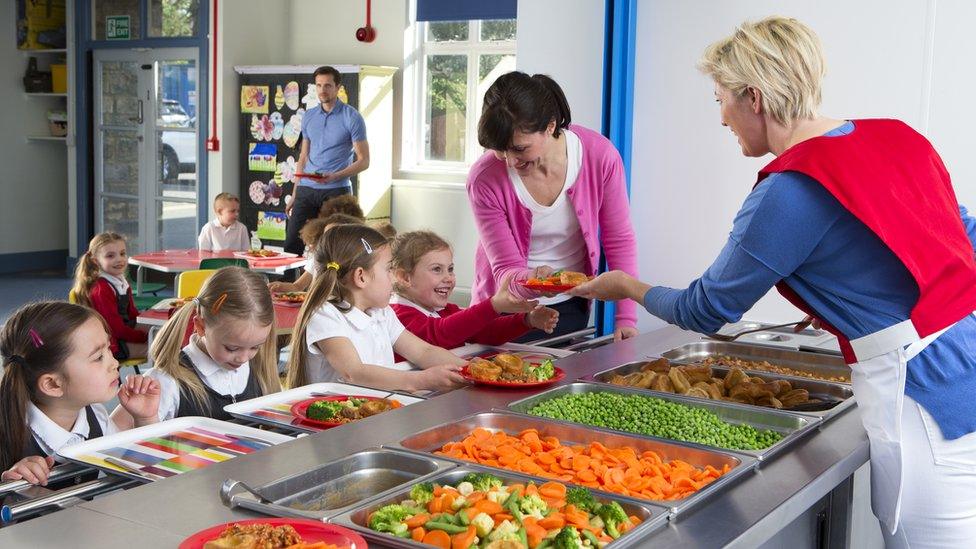Teachers 'need help' tackling poverty impact on education
- Published
- comments

Teachers cannot tackle the impact of child poverty on education by themselves, according to Scotland's largest teachers' union, the EIS.
BBC Scotland has heard several stories which highlight the effects of deprivation on school children.
They include stories about dirty clothes, hunger and children being unable to start school on time.
The Scottish government wants to close the performance gap in schools between relatively rich and poor children.
It plans to spend £750m by 2021 raising attainment in schools.
EIS president Nicola Fisher has argued that austerity in public spending and welfare reform have added to the child poverty problem, though she believes the Scottish government has tried to mitigate their effects.
She said: "I think we actually have to look at the fact that this will take a whole society to fix and stop expecting the teachers and the schools to fix it all."
Education Secretary John Swinney said the government took a holistic view of the wellbeing of young people - touching on a wide range of subjects other than education.
Among the individual anecdotal stories BBC Scotland has heard:
One school worked with a charity to raise money to buy a washing machine. The child had been wearing dirty clothes.
One home economics teacher believed hungry children were taking food from the class.
Children routinely arriving late because their parents could not get them to bed or school on time.
But there are other challenges - which while serious are less extreme. Research by the EIS has suggested such examples are more widespread.
For instance, children might be wearing clothes which are worn out or which they have outgrown. Or children may also be missing out on school trips or other extra activities because their parents cannot afford to let them take part.
One secondary teacher, who recently left the profession after 20 years, described the challenges she had encountered or which others she knew had faced.
Her full name is not being published in order to ensure there is no risk of identifying children.

Some local authorities offer free school meals all year round to mitigate the affects of poverty
The teacher, called Joanna, said: "There are lots of examples where teachers are the first person to notice something is wrong that is poverty related in a child's life... Some of these signs can be so gradual that it can take time to notice and to actually discover what's going on.
"Children coming to school hungry, not having had enough sleep, the huge effect of sleep deprivation, pupils who clearly have no guidance as to what time to go to bed or what time to get up.
"Quite often pupils staying awake and playing computer games until the early hours of the morning and freely admitting to that, and you can see the effect of that on their attention span and their ability to engage in the lesson."
She added: "For some pupils actually being in school at all is a great achievement. They've managed to get themselves to school because they don't have a parent responsible at home to get them up and get them to school. So getting in the school door at some time around 09:00 is a huge achievement.
"You have to be very careful when you're working with pupils like that not to be too disciplinarian about the fact that they're late for school. At the school I worked in it was quite normal for pupils to be coming into school at any time up to 10:00."
Joanna said there were times she had been in tears or very worried about a pupil's situation and she said she believed employing more classroom assistants could help ensure children get more support. She also said including some social work training in teacher training could be beneficial.
The effect of poverty and disadvantage on individual children is not confined to schools in the poorest areas of Scotland. It can potentially affect individuals in almost any community.

Analysis
BBC Scotland education correspondent Jamie McIvor
This is not a straightforward issue - it is not simply about the cost of living on a low income or, for instance, helping a child in a house without books improve their reading.
It is also about difficult issues which face society as a whole: for example social exclusion and intergenerational unemployment and poverty. There is also the issue of the "working poor" - a child may be living in poverty even though a parent is working.
The Scottish government wants to drive up attainment in schools.
The government is providing £750m over the course of this parliament to help schools in disadvantaged areas. Some of this money goes to councils - some to schools directly.
Meanwhile the Child Poverty (Scotland) Act 2017 places a duty on the Scottish government to work to eradicate child poverty by 2030.

Mr Swinney said councils and the government had to work together to tackle poverty and barriers to learning.
He said: "If you look at the child poverty plan that the government has recently set out, it is a broad set of interventions across a whole range of different policy areas - health, education, justice, housing, community development.
"Fundamentally the education system has got to play its part because education has the power to transform the lives of young people.
"What we have to focus on are some of the barriers that exist to young people being able to have their lives transformed by education.
"Some of these barriers may be about their personal self esteem, they may be about their nutrition, they may be about the fact they don't feel they have feel as if they have enough money to buy the school uniform and all that goes with it."

Councils will offer a minimum school clothing grant of £100, the Scottish government announced recently
A number of councils are now offering free meals during school holidays. North Lanarkshire is set to provide them 365 days a year.
Last week the Scottish government announced that all councils would offer a minimum school clothing grant of £100.
The government says it plans to spend £750m between 2016 and 2021 tackling the impact of poverty on education in schools.
Last week it announced how the latest tranche of £50m would be allocated.
The range of things schools and councils spend this extra money on is diverse and is not being prescribed.
Sometimes it may be spent on extra staff, new technology to make lessons more engaging or additional resources.
Other things schools in Scotland are spending their money on include "campus cops" - plain clothes officers who work with the school on a range of engagement projects.
- Published30 May 2018

- Published25 May 2018

- Published16 February 2018
